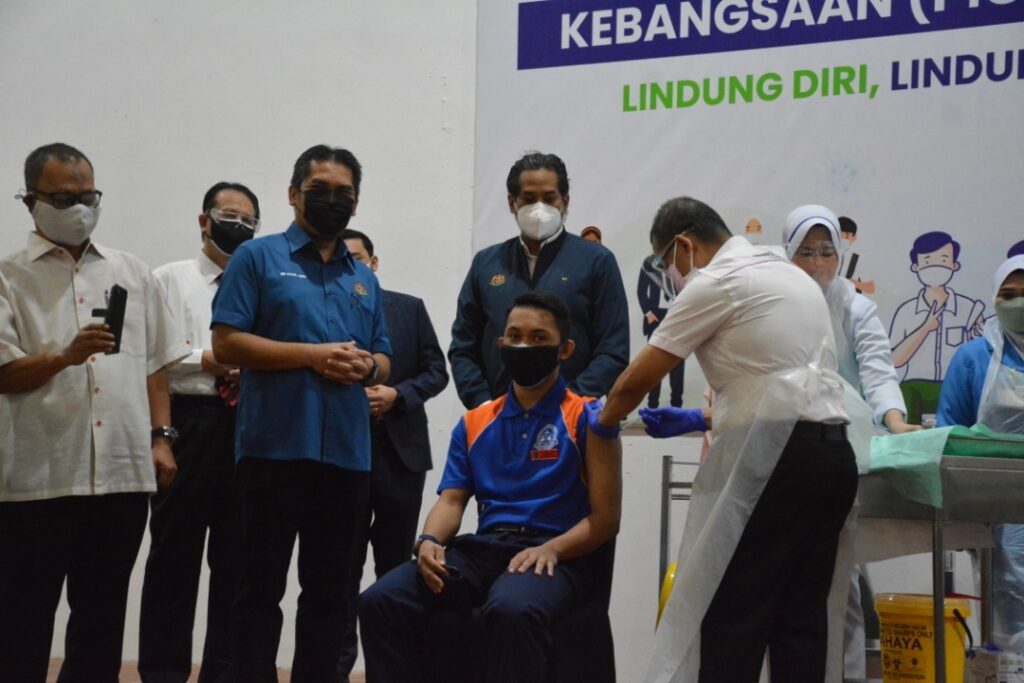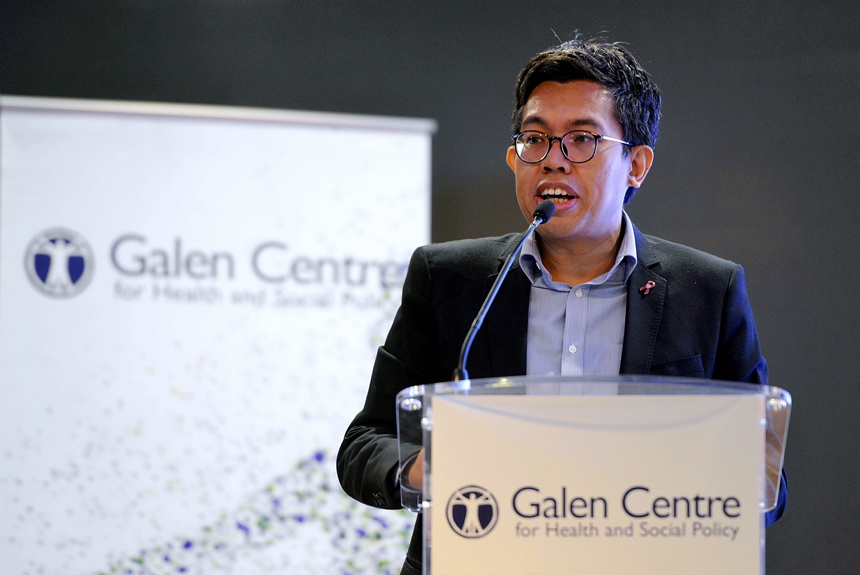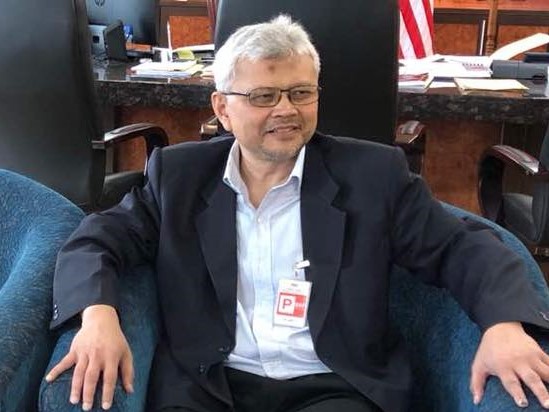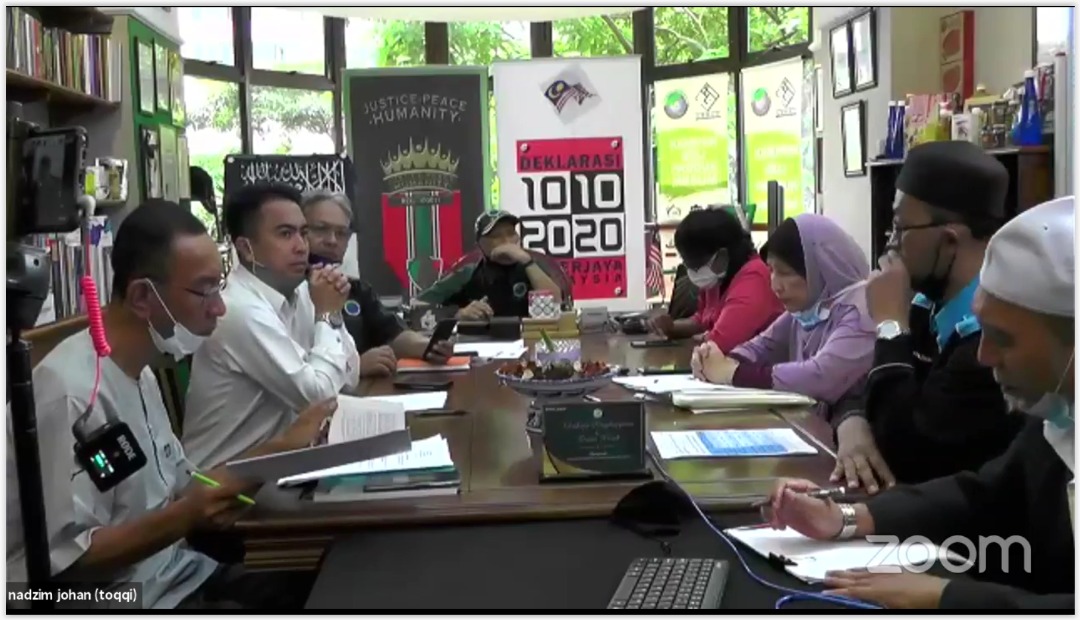KUALA LUMPUR, Sept 22 — “I was very disturbed by KJ’s statement yesterday when he said he would force teachers and all civil servants to get vaccinated,” a sobbing woman told a press conference organised by vaccine-hesitant groups, referring to Health Minister Khairy Jamaluddin.
“If they eventually do force teachers to get vaccinated and we’re prohibited from going to school to teach, what can I do? I have a family to support. I don’t know what to do or where to go if I’m forced to be vaccinated,” she added, speaking in Malay.
The press conference yesterday was organised by a group of vaccine-hesitant non-government organisations (NGOs), including the Malaysia Muslim Consumers Association (PPIM), to protest against mandatory Covid-19 vaccination, to stop discrimination against unvaccinated people, and to postpone coronavirus inoculation for children and pregnant women. All but one of the speakers at the meeting were unmasked.
By all accounts, Malaysia’s Covid-19 vaccination programme appears to be successful, reaching 80 per cent of the country’s adult population that have been fully inoculated as of yesterday, a goal often touted by the government as the “herd immunity” threshold.
In terms of total population coverage, which experts say is a more accurate gauge than adult vaccination rates, about 57 per cent of Malaysia’s total population has been fully vaccinated against Covid-19.
However, the Malaysian vaccine-hesitant movement uses more sophisticated and nuanced arguments now that appear reasonable on the surface, but are designed to plant doubt. In fact, speakers at yesterday’s press meet all claimed to have received Covid-19 vaccination.
“I like vaccines,” one of them said.
The PPIM press conference did not spout outlandish conspiracy theories like microchips being planted in Covid-19 vaccines. Instead, two medical doctors heavily touted natural immunity from infection.
“In the EU (European Union), natural immunity is recognised as a Covid passport, but in Malaysia, in spite of the fact that I had natural infection and immunity, MySejahtera does not reflect the fact that I’m an immune person,” said consultant histopathologist Dr Manimalar Selvi Naicker, who complained about being denied entry to business premises while waiting for her vaccination appointment, even though she was previously infected.
Dr Manimalar conveniently ignores the fact that people risk hospitalisation or death if they get infected with Covid-19, especially if they are unvaccinated. About 2.1 million people have contracted coronavirus to date, including 23,744 deaths with a 1.1 per cent case fatality rate.
Should people take the risk of getting infected — when hospitals in several states are still full — just to get natural immunity, as opposed to taking a jab to prevent infection, severe disease, and more importantly, death, in the first place?
A review published in the British Medical Journal (BMJ) last June said it is difficult to state definitively how long Covid-19 immunity from natural infection or vaccination lasts. Neutralising antibodies in Covid-19 patients slowly fall over time. One study found that antibodies remained present in people who recovered from Covid-19 five to seven months after illness.
Various studies also show an immune response involving memory T and B cells — which are crucial in establishing long-term immunity — emerging after Covid-19 infection, but an immunology professor from the University of Edinburgh was quoted saying that people’s immune systems tend to respond very differently to natural infection. The immune response from vaccination, on the other hand, “is much more homogenous”.
Parents Unwilling To Vaccinate Their Children Against Covid-19

“If we disagree with the government’s instructions for our children aged 12 to 17 years to get vaccinated, what action will the government take against us? The government must give an alternative to parents who don’t want their child to be vaccinated to allow them to still go to school,” said one caller to the PPIM press conference, who identified herself as Fauziah.
Consultant internal medicine physician Dr Norshinah Kamarudin, who opposed discriminating against adolescents who do not get Covid-19 vaccination, said coronavirus infection among healthy children is usually mild.
“The Covid-19 recovery rate is almost 100 per cent,” she said at the press conference. “This is the true herd immunity in our society. After recovery from Covid, the individual no longer infects other people. It stops there.”
Yes, detected cases of reinfection are rare, according to the BMJ review. Malaysia’s official Covid-19 case fatality rate is only 1.1 per cent, but the Ministry of Health (MOH) is very exclusive in classifying Covid-19 deaths, excluding cases who may have died from related complications after hospital discharge. Not to mention that so-called “recovery” excludes long Covid cases who suffer from symptoms persisting up to three months or more after initial acute illness.
The biggest complaint in the PPIM meeting is the ubiquitous use of Covid-19 vaccine passports in Malaysia that prohibit people who have not been double-jabbed — or who do not possess “the new birth certificate”, as one speaker said — from entering restaurants, getting a haircut at the salon, or praying at the mosque.
“I’ll be honest, I haven’t gone to the mosque for two years,” Ahmad Jufliz Abd Jalil, a lawyer, said at the press conference.
“My friend did say to me that he would give me special privileges to attend Friday prayers at the mosque, but even if I were to go, I cannot pray in social distancing, I must “sembahyang saf”,” he added, referring to the practice of congregational prayer where worshipers pray shoulder-to-shoulder. “So I’m forced to pray with family or friends until now.”
Dr Manimalar pointed out that fully vaccinated people can still get infected and transmit coronavirus, something that has been acknowledged not just by MOH, but also by international studies on breakthrough infections.
“The public health rationale for forcing anyone to vaccinate is just not there. You should vaccinate for your own benefit. Definitely we know, based on current evidence, if you vaccinate, your risk of dying and being very sick is reduced,” she said.
“You should vaccinate for yourself, but you cannot force people to vaccinate as a public health measure to prevent transmission. That is unscientific already, we know that.”
Vaccine Passports Fuel Anti-Vax Sentiment

When asked if Malaysia should drop vaccine passports, so as to persuade unvaccinated people to voluntarily get shots, Galen Centre for Health and Social Policy chief executive Azrul Mohd Khalib said he had always been reticent about vaccine passports.
“While it sounds like it makes sense, something like that where allowing those fully vaccinated to enjoy more freedoms would create and widen social divisions. Something like ‘have jabs’ and ‘have-not jabs’,” Azrul told CodeBlue.
“There could be serious consequences resulting in people being denied essential and necessary access to services and even places like supermarkets, just because their appointment dates haven’t come up and they haven’t been privileged to get vaccinated yet. It will give fuel and ammunition to those who are hesitant and anti-vax.”
Just like the PPIM meeting’s over-emphasis on natural immunity from infection, Azrul has also observed similar sentiments expressed by vaccine-hesitant individuals in Kampung Datuk Keramat in Kuala Lumpur.
“This argument will soon translate to the use of vaccines for adolescents.”
As to whether Covid-19 vaccine hesitancy is a significant problem, Azrul expects certain communities to continue propagating misinformation and to run campaigns undermining vaccination efforts.
“They exist in both rural and urban settings such as Shah Alam, Bukit Jelutong, and Bandar Baru Bangi. Many are from the Malay communities. Many have tertiary level education. Some are even medical professionals. They are a minority but they exist everywhere, including among the civil service and health care sector,” he said.
The Public Service Department said last August 29 that 2.2 per cent or about 35,000 of 1.6 million civil servants have yet to register for their Covid-19 shots.
Most Vaccine-Hesitant Are From Malay Heartlands

Consultant paediatrician Dr Musa Mohd Nordin cited an MOH survey that found Covid-19 vaccine acceptance levels remaining stagnant at 65 per cent up until February this year.
He said the majority of anti-vaxxers are in the Malay heartland of Kedah, Pahang, Terengganu, and Kelantan.
“They are much influenced by the religious teachers (ustazs) and practitioners of homeopathy and other local remedies,” Dr Musa told CodeBlue.
Official statistics do show that those states have among the lowest Covid-19 vaccine registration rates of their total populations in the country as of September 20: Kedah (69 per cent), Pahang (67 per cent), Terengganu (65 per cent), and Kelantan (53 per cent).
“The IT-savvy urbanites, mostly among the Malays in Perak and Selangor, are the middle class anti-vaxxers much influenced by social media,” Dr Musa added.
He also said MOH has not fully engaged general practitioners (GPs) for the Covid-19 vaccination programme, pointing out that all adult inoculation is undertaken by private family physicians. The National Immunisation Programme (NIP) in public clinics only comprises childhood vaccines.
“Adults, families trust their GPs with their health care, including vaccination.”
ProtectHealth Corporation CEO Anas Alam Faizli, however, tweeted Monday that private medical practitioners and health NGOs administered 47 per cent of doses under the National Covid-19 Immunisation Programme (PICK).
Dr Musa urged the government to identify the “complex” mix of anxieties about coronavirus vaccines, to identify the medium propagating vaccine-hesitant sentiment, and to address religious concerns.
“Some parents also feel that vaccines are no longer necessary today because we no longer see children being infected by the terrible effects of vaccine-preventable diseases,” he said.
“This is why we are victims of our own success; immunisation has done so well in the last generation that today’s generation are taking good health for granted, forgetting that our parents and grandparents vaccinated us in the past to protect us from vaccine-preventable infectious diseases.”
Azrul told the government to increase public education about Covid-19 vaccination. “There are no shortcuts in public health. You have to do the hard work of educating and convincing people.”








